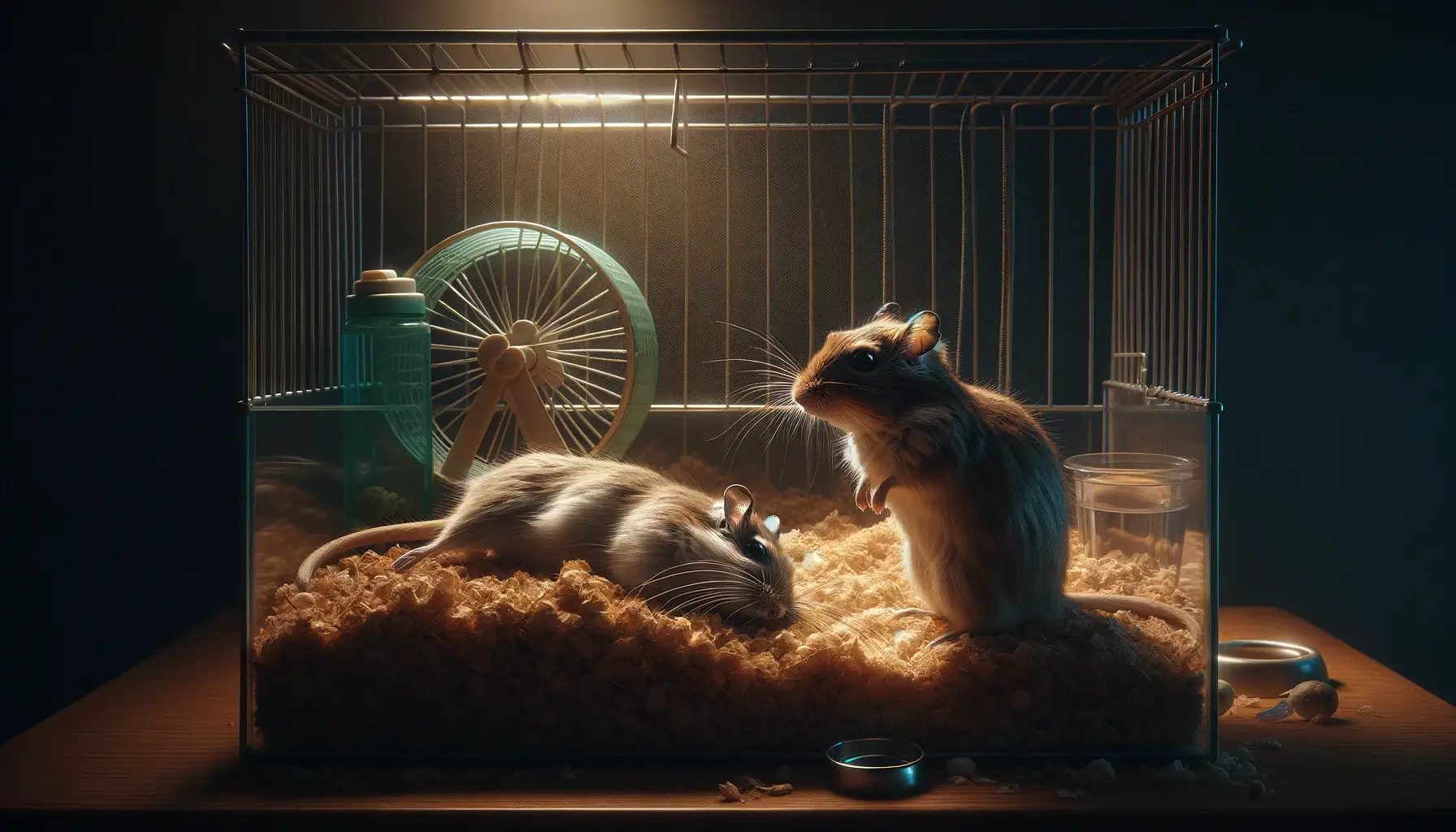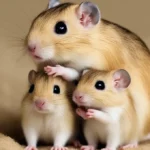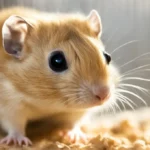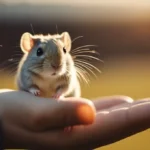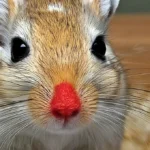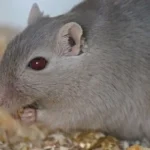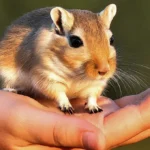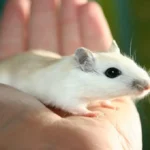Gerbils are known for their playful nature and sociable behavior, making them beloved pets around the world. These small rodents thrive in environments where they can interact with their kind, forming bonds that are vital for their emotional well-being.
However, pet owners often face a dilemma when one gerbil dies, leaving its companion alone. In this article we will guide whether gerbils can live alone after the loss of a partner and how to support them through such times.
Understanding Gerbil Companionship
Gerbils are inherently social creatures that live in groups in the wild. This social structure is crucial for their survival, providing them with protection, warmth, and emotional support.
In captivity, gerbils form similar bonds with their cage mates, often seen cuddling or playing together to strengthen their connection. The loss of a companion, therefore, can have a profound impact on the surviving gerbil, potentially leading to stress, depression, and a decline in health.
The companionship between gerbils is not merely a matter of convenience but a deep-rooted aspect of their existence. These bonds are formed based on mutual grooming, shared activities, and the comfort of another’s presence.
When a gerbil loses its companion, it’s not just losing a cage mate but a significant part of its social world. This loss can be particularly hard-hitting, given their natural inclination to live in closely-knit groups.
Signs of Grieving in Gerbils
Grieving in gerbils can manifest in several behavioral and physical signs that indicate distress or depression. Recognizing these signs is the first step in providing the necessary support to the surviving gerbil. Some of the most common signs include:
- Lethargy: A grieving gerbil may show a marked decrease in activity, spending more time sleeping or lying still in its cage.
- Loss of Appetite: There may be a noticeable decline in food and water intake, which can lead to weight loss and dehydration if not addressed promptly.
- Decreased Social Interaction: The gerbil may show less interest in interacting with its owner or any remaining cage mates.
- Changes in Grooming Habits: Over-grooming or neglecting to groom itself can be a sign of stress or sadness in gerbils.
Understanding these signs of grieving is crucial for gerbil owners to provide the right care and attention during this difficult period. It’s important to remember that each gerbil is unique, and their way of coping with loss can vary.
Some may recover quickly with minimal intervention, while others may require additional support and time to adjust to their new circumstances.
Can Gerbils Live Alone?
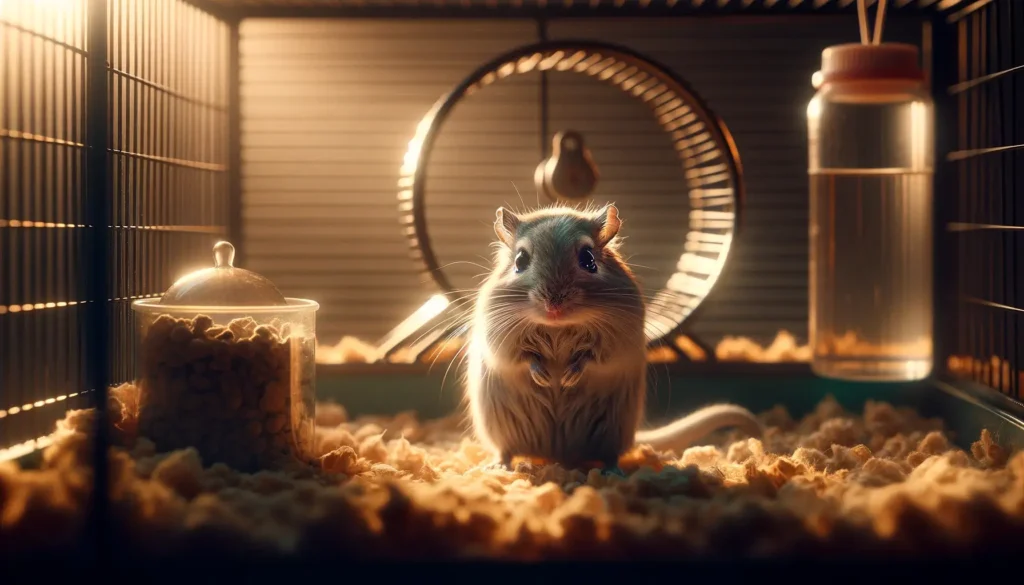
Gerbils, with their inherent need for social interaction, face significant challenges when left alone. While a gerbil can survive in solitude, its quality of life may diminish without the companionship of its kind.
Solitary gerbils are at risk of developing signs of stress and depression, such as decreased activity levels and loss of appetite. These changes not only affect the gerbil’s emotional well-being but can also lead to health issues over time.
The debate on solitary living for gerbils leans towards finding companionship as the healthier option. Gerbils thrive in environments where they can engage in natural behaviors like grooming, playing, and communicating with another gerbil.
Therefore, while a gerbil can live alone technically, it’s not the ideal scenario for their overall well-being.
Helping a Gerbil Cope with Loss
The period following the loss of a companion is critical for the surviving gerbil. Here are steps to help your gerbil navigate through its grief:
- Provide Extra Attention and Care: Spend more time interacting with your gerbil. Gentle handling and play can offer comfort and reduce feelings of loneliness.
- Enhance the Living Environment: Introduce new toys and rearrange the cage to stimulate your gerbil’s interest and encourage exploration.
- Monitor Health and Behavior: Keep a close eye on your gerbil’s eating, drinking, and activity levels to catch any signs of distress early.
By addressing the emotional and physical needs of your gerbil during this time, you can help ease the transition into life without its companion.
Introducing a New Companion
Introducing a new gerbil is a delicate process but can be rewarding for both the pet and the owner. Here’s how to approach it:
- Timing is Key: Allow your gerbil some time to adjust after its loss before introducing a new companion. This period varies but observing your gerbil’s behavior for signs of recovery is a good start.
- The Split Cage Method: This technique involves placing the new gerbil in the same cage as your existing pet but with a divider between them. This allows them to get accustomed to each other’s scent without direct contact, reducing the risk of aggression.
- Gradual Introduction: After a period of living side by side, allow supervised interactions without the divider for short durations, gradually increasing the time as they become more comfortable with each other.
Finding a new companion for your surviving gerbil can bring back the joy and social interaction that is so crucial to their well-being. However, it’s essential to proceed with patience and care to ensure a smooth and stress-free introduction.
FAQs
Should I get a new companion for my surviving gerbil?
Yes, considering gerbils are highly social animals that thrive in the company of their kind, introducing a new companion can significantly improve the quality of life for your surviving gerbil. Ensure you follow the split cage method to facilitate a smooth introduction.
How long can gerbils live alone after one dies?
Gerbils can live alone indefinitely after a companion dies, but their quality of life may suffer due to loneliness. It’s crucial to monitor their health and behavior closely and consider introducing a new companion to maintain their well-being.
What to do when one gerbil dies?
When a gerbil dies, remove the deceased from the cage promptly to prevent distress to the surviving gerbil. Clean the cage thoroughly to remove any scent of the deceased. Offer extra care and attention to the surviving gerbil and consider introducing a new companion using the split cage method.
How long do gerbils grieve?
The grieving process varies among individual gerbils. Some may show signs of grieving, such as lethargy and decreased appetite, for a few weeks, while others may adjust more quickly. Monitoring your gerbil’s behavior and providing extra care during this time can help ease its grief.
Can gerbils die of loneliness?
While loneliness itself isn’t a direct cause of death, the stress and depression resulting from isolation can lead to health issues that may shorten a gerbil’s lifespan. Providing a companion and ensuring a stimulating environment are key to preventing these adverse effects.
How can I tell if my gerbil is depressed?
Signs of depression in gerbils include changes in behavior such as reduced activity, loss of interest in food and play, and neglecting grooming habits. If you notice these signs, it’s important to address the underlying cause and consider seeking advice from a veterinarian.
Conclusion
In conclusion, while gerbils possess the resilience to live alone, their inherent social nature underscores the importance of companionship for their overall well-being.
The loss of a gerbil companion presents a challenging period for the survivor, yet with attentive care, environmental enrichment, and the potential introduction of a new friend, these small creatures can continue to lead joyful and fulfilling lives.
As gerbil owners, our understanding and response to their social needs can profoundly impact their happiness and health, ensuring our furry friends thrive in a loving, supportive environment.

